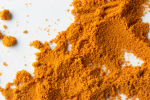
New turmeric-based formulation may release anti-inflammatory benefits throughout body
 Over-the-counter curcumin supplements might not get past your digestive system, according to some experts, but now new research has found that a modified form of the spice can release its anti-inflammatory qualities throughout the body.
Over-the-counter curcumin supplements might not get past your digestive system, according to some experts, but now new research has found that a modified form of the spice can release its anti-inflammatory qualities throughout the body.
Curcumin is a naturally occurring compound found in the spice turmeric that has been used for centuries in traditional Chinese medicine. Although some evidence suggests curcumin can lower inflammation, it is not absorbed well by the body; most stays in the gastrointestinal tract, and any portion that’s absorbed tends to be quickly broken down by the body.
But now research published in PLOS ONE highlights that when curcumin powder is mixed with castor oil and polyethylene glycol it creates fluid teeming with microvesicles that contain curcumin. This process allows the compound to dissolve and be more easily absorbed by the gut to enter the bloodstream and tissues.
“There’s a reason why this compound has been used for hundreds of years in Eastern medicine,” says Dr Nicholas Young, lead author. “And this study suggests that we have identified a better and more effective way to deliver curcumin and know what diseases to use it for so that we can take advantage of its anti-inflammatory power.”
The researchers showed – for the first time – that curcumin can stop recruitment of specific immune cells that, when overactive, are linked to such problems as heart disease and obesity. And when mice were given the curcumin-based drug, an acute inflammatory reaction was shut down by blocking activation of a key protein that triggers the immune response.
The next step is a study that looks into if curcumin in this form can counter the chronic inflammation that is linked to sickness and age-related frailty. Control of inflammation in a lupus model is the first port of call.
“We envision that this nutraceutical [a food/nutrient that can provide medical benefits] could be used one day both as a daily supplement to help prevent certain diseases and as a therapeutic drug to help combat the bad inflammation observed in many diseases,” Dr Young says. “The distinction will then be in the amount given – perhaps a low dose for daily prevention and higher doses for disease suppression.”
Image credit: Stephen Jackson
Subscribe to Arthritis Digest, the UK’s fastest growing arthritis magazine for all the latest arthritis news, reviews and celebrity interviews. You’ll know what your doctor is talking about, what new drugs are in the pipeline and be up to date on helpful products. Hard copy and digital versions both available. Click here for more information.
